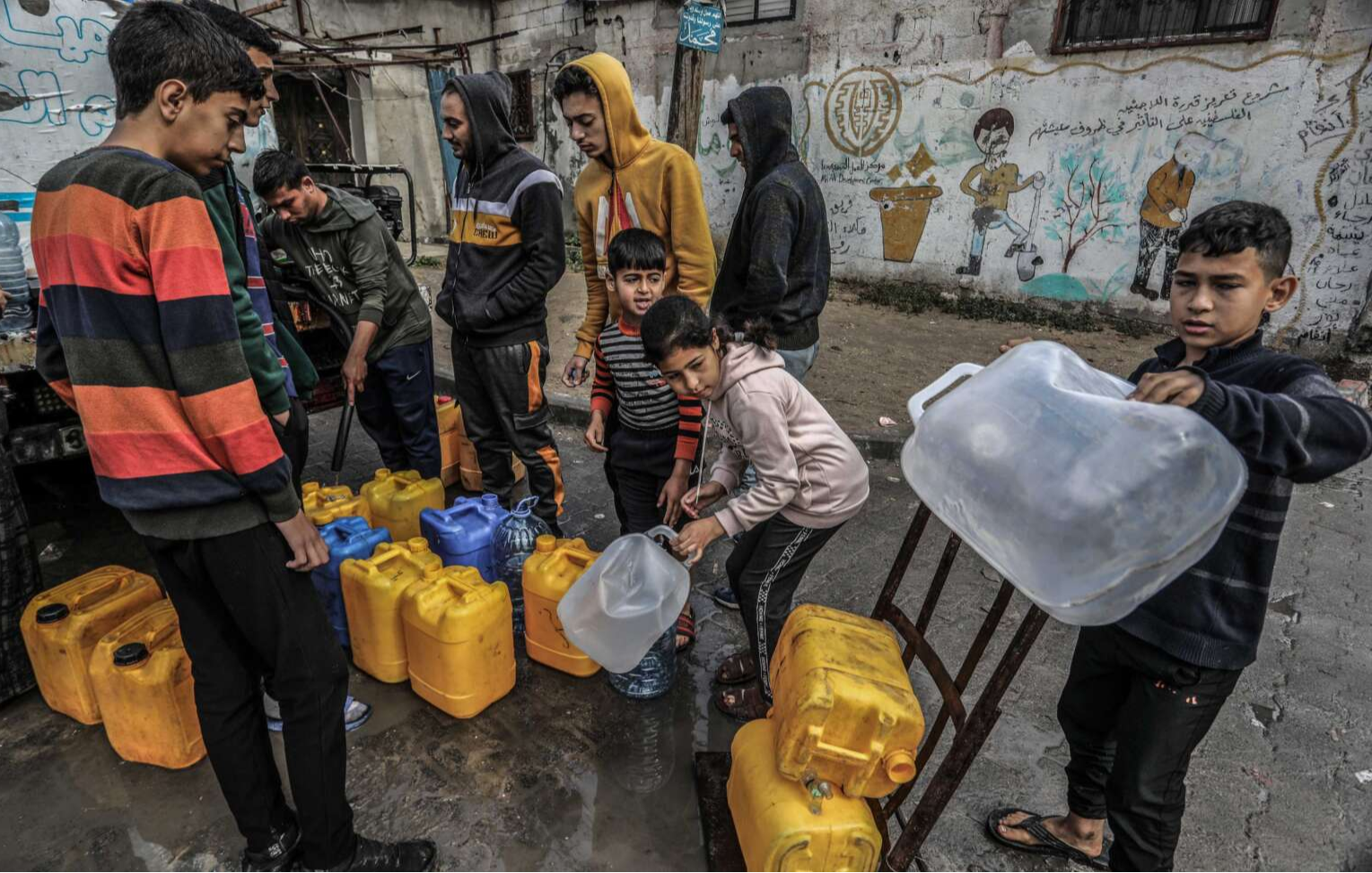
Palestinian children wait with jerry cans to fill them with drinking water in Rafah
ABED RAHIM KHATIB / PICTURE ALLIANCE VIA GETTY IMAGES
By Sharon Zhang
Oxfam has warned that Israel’s longstanding policy of using water as a weapon against Palestinians has reached its peak amid Israel’s genocide, with water access for Palestinians in Gaza now at a small fraction of pre-genocide levels as Palestinians die of dehydration, starvation and disease.
According to a report on Israel’s water deprivation policies by Oxfam, Israel has reduced water access in Gaza by a whopping 94 percent since October. This means Palestinians only have access to an average of roughly 4.7 liters of water per person per day, or only about 1.2 gallons a day.
In the supposed “humanitarian safe zone” in al-Mawasi — which Israeli forces have attacked relentlessly — Palestinians only have access to an average of 2.5 liters per day, the report said. This paltry amount of water must be used for all purposes: drinking, cooking, bathing, laundry, and more. It is far less than the minimum of 15 liters needed per day in emergencies, as determined by UN officials.
This dramatic reduction in water access is the result of Israel’s sustained attacks on Gaza’s water infrastructure, Oxfam said. Israel has destroyed 100 percent of wastewater treatment plants in Gaza and has destroyed all water desalination plants and water sanitation warehouses in Gaza City, while destroying the vast majority of infrastructure in other parts of the Strip.
The report found that Israel has damaged or destroyed five sanitation sites every three days just since October last year. This amounts to nearly 70 percent of water and sanitation infrastructure in Gaza being compromised by Israel.
“The Israeli military’s operations in Gaza have repeatedly committed violations of international humanitarian law depriving people of access to water, an indispensable resource for their survival, by damaging or destroying water infrastructure, contaminating water sources, and blocking supplies needed to enable water production,” the report says.
Meanwhile, delivering water in humanitarian convoys is nearly impossible due to Israel’s aid blockade, the report says. Maintaining what is left of sanitation infrastructure is its own challenge, as Israeli forces have targeted maintenance workers within Gaza as part of their attacks on all systems supporting life in Gaza.
“My colleagues and I have been living through a nightmare these past nine months, but we still feel it’s our responsibility and duty to ensure everybody in Gaza is getting their minimum right of clean drinking water,” Monther Shoblak, general manager of Gaza’s water utility, said in a statement. “It’s been very difficult, but we are determined to keep trying — even when we witness our colleagues being targeted and killed by Israel while undertaking their work.”
Israel’s current attacks on water access are part of its decades-long campaign to exercise control over basic needs in Gaza in order to kill Palestinians through deprivation.
As a result of Israel’s deprivation campaign, water access was already subpar in Gaza before October. Though the World Health Organization recommends a daily quantity of 100 liters per day for regular activities, as of March 2023, Palestinians in Gaza had access to only about 83 liters per day, while those in the occupied West Bank had access to 89 liters a day. Israelis, including those who live in illegal settlements in the West Bank, have access to almost 250 liters a day, by comparison.
This means that Israel, over the course of its nine months of genocide in Gaza, has cut water access in Gaza to 6 percent of levels that were already insufficient for regular life.
xxxxxxxxxxxxxxxxxxxxxxxxxxxxxxx
This article is licensed under Creative Commons (CC BY-NC-ND 4.0), and you are free to share and republish under the terms of the license.
SHARON ZHANG
Sharon Zhang is a news writer at Truthout covering politics, climate and labor. Before coming to Truthout, Sharon had written stories for Pacific Standard, The New Republic, and more. She has a master’s degree in environmental studies. She can be found on Twitter: @zhang_sharon.

